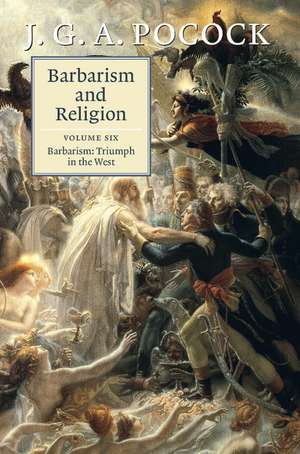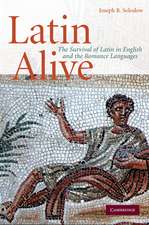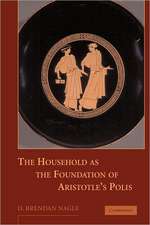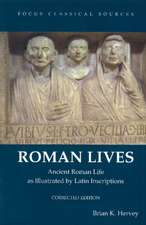Barbarism and Religion: Volume 6, Barbarism: Triumph in the West
Autor J. G. A. Pococken Limba Engleză Hardback – 11 mai 2015
| Toate formatele și edițiile | Preț | Express |
|---|---|---|
| Paperback (1) | 281.22 lei 6-8 săpt. | |
| Cambridge University Press – 28 mar 2018 | 281.22 lei 6-8 săpt. | |
| Hardback (1) | 876.98 lei 6-8 săpt. | |
| Cambridge University Press – 11 mai 2015 | 876.98 lei 6-8 săpt. |
Preț: 876.98 lei
Preț vechi: 1019.75 lei
-14% Nou
Puncte Express: 1315
Preț estimativ în valută:
167.83€ • 182.24$ • 140.98£
167.83€ • 182.24$ • 140.98£
Carte tipărită la comandă
Livrare economică 23 aprilie-07 mai
Preluare comenzi: 021 569.72.76
Specificații
ISBN-13: 9781107091467
ISBN-10: 1107091462
Pagini: 539
Dimensiuni: 160 x 235 x 28 mm
Greutate: 1 kg
Editura: Cambridge University Press
Colecția Cambridge University Press
Locul publicării:New York, United States
ISBN-10: 1107091462
Pagini: 539
Dimensiuni: 160 x 235 x 28 mm
Greutate: 1 kg
Editura: Cambridge University Press
Colecția Cambridge University Press
Locul publicării:New York, United States
Cuprins
Introduction; Part I. The Constantinian Empire: 1. Constantinople: a new city and a new history; 2. Constantine to Julian: the disintegration of a dynasty; Part II. The Church in the Empire: 3. Constantine's second revolution; 4. Theology and the problems of authority; 5. Nicaea and its aftermath; 6. The reign of Constantius and the Arian triumph; 7. The structure of chapter 21; Part III. The Interlude of Julian: 8. Gibbon and Julian: the history of an anomaly; 9. Julian apostate: the failure of an alternative; 10. Julian as persecutor: from toleration to the failure of repression; 11. The sojourn at Antioch and the Persian disaster; Part IV. Barbarism: The First Catastrophe: 12. Valentinian I and Valens: the turn to the west; 13. The geography and history of the western Decline and Fall; Part V. The Triumph of Orthodoxy and the Last Emperor: 14. The reign of Theodosius: triumphs preceding disaster; 15. Ambrose of Milan: the church and the empire; 16. Theodosius narrated and re-narrated: the death and rebirth of polytheism; Part VI. The Barbarisation of the West; 17. The Gothic phase: the sack of Rome and the loss of the transalpine west; 18. Vandals and Huns: the twin empires and the loss of Africa; 19. Attila and Aetius: the Hun invasions of the west; 20. The end of the western succession; Part VII. After the Fall: Towards a History Not Written: 21. Ends and beginnings: the conclusion of Gibbon's third volume; 22. The barbarian kingdoms and their laws: the beginnings of a mediaeval history; 23. The general observations; 24. Gibbon's first trilogy and its successor volumes; Conclusion of the present series; Bibliography; Index.
Recenzii
'By uniting civil with ecclesiastical histories, and by describing narratives of antiquity created by, and in a world on the brink of, revolutionary change, Pocock concludes his sixth volume in scholarly territory initially explored by the pioneering work of Arnaldo Momigliano and Franco Venturi, to both of whom the first volume of Barbarism and Religion was dedicated. In his end is his beginning; where Pocock's uniquely authoritative contribution to historical scholarship magisterially concludes, that of many others will surely follow.' B. W. Young, The English Historical Review
Notă biografică
Descriere
The sixth and final volume in an acclaimed series situating Edward Gibbon in a series of contexts in eighteenth-century European history.

















